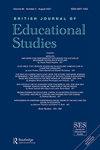谁回应网络钓鱼邮件?一项利用Pisa数据对15岁学生进行的国际调查
IF 2.1
3区 教育学
Q2 EDUCATION & EDUCATIONAL RESEARCH
引用次数: 0
摘要
本文章由计算机程序翻译,如有差异,请以英文原文为准。
WHO RESPONDS TO PHISHING EMAILS? AN INTERNATIONAL INVESTIGATION OF 15-YEAR-OLDS USING PISA DATA
ABSTRACT Young people are facing an ever-increasing array of online dangers. One of the most common is receipt of a phishing email. This paper presents new evidence on the characteristics of young people most likely to respond to such emails. I find approximately one-in-seven 15-year-olds are at risk of responding to a phishing email, rising to one-in-five amongst those from disadvantaged socio-economic backgrounds. Such risks are particularly high amongst young people with low levels of cognitive skill. Unfortunately, students who are taught about the dangers posed by phishing emails at school are just as likely to take inappropriate actions following their receipt as their peers who have not. I thus conclude that greater emphasis and higher quality instruction needs to be provided to young people about the online risks they face, particularly to those from disadvantaged socio-economic backgrounds and low academic achievers.
求助全文
通过发布文献求助,成功后即可免费获取论文全文。
去求助
来源期刊

British Journal of Educational Studies
EDUCATION & EDUCATIONAL RESEARCH-
CiteScore
4.50
自引率
5.30%
发文量
36
期刊介绍:
The British Journal of Educational Studies is one of the UK foremost international education journals. It publishes scholarly, research-based articles on education which draw particularly upon historical, philosophical and sociological analysis and sources.
 求助内容:
求助内容: 应助结果提醒方式:
应助结果提醒方式:


